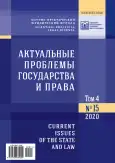DISSEMINATION OF DAMAGING INFORMATION (DEFAMATION) AS A TYPE OF CIVIL TORT: CONCEPT DEFINITION
- Authors: Smorchkova V.O.1
-
Affiliations:
- Saratov State Law Academy
- Issue: Vol 4, No 15 (2020)
- Pages: 376-382
- Section: Материальное право
- URL: https://journal-vniispk.ru/2587-9340/article/view/304035
- ID: 304035
Cite item
Abstract
We consider such category as defamation, which is widespread in many foreign countries. Defamation is the dissemination of damaging information, which, however, is true. This concept has become widespread in the last century, many states have adopted special legislation that mediates relations in this area. For example, the United Kingdom has the “Defamation Act 1996” and Singapore has the “Defamation Ordinance 1960”. We emphasize that in the same 1960s in our country “the system of defamation seemed absolutely unacceptable and contrary to the spirit of society”. In the course of study, comparative legal methods are used to analyze the legislation of states with the Anglo-Saxon and Romano-Germanic legal system. Based on the study of the doctrinal points of view of scientists and the positions of higher courts, the definition of this category is formed from the position of civil tort. The following definition is proposed: “Defamation is a violation of civil legislation, which consists in the dissemination of false information damaging the honor, dignity and business reputation of a person and also the dissemination of truthful personal information, the disclosure of which violates the conservation law are listed in the intangible benefits of the citizens”. We analyze the provisions of the Resolution of the Plenum of the Supreme Court of the Russian Federation of February 24, 2005 no. 3 “On judicial practice in cases of protecting the honor and dignity of citizens, as well as the business reputation of citizens and legal entities”. We conclude that the Supreme Court of the Russian Federation borrowed advanced provisions from the judgments of the European Court of Human Rights.
About the authors
Valeriya Olegovna Smorchkova
Saratov State Law Academy
Author for correspondence.
Email: smorchkova_V@mail.ru
ORCID iD: 0000-0002-8965-307X
Master’s Degree Student
Russian Federation, 1 Volskaya St., Saratov 410056, Russian FederationReferences
- Buykin A.Y. Osobennosti pravovoy zashchity ot diffamatsii v usloviyakh razvitiya global’noy seti Internet [Features of legal protection against diffamation under the development of the global internet network]. Vestnik Moskovskoy mezhdunarodnoy akademii – Bulletin of the Moscow International Academy, 2018, no. 2, pp. 34-49. (In Russian).
- Noy I.S. Okhrana chesti i dostoinstva lichnosti v sovetskom ugolovnom prave [Protection of the Honor and Dignity of the Individual in Soviet Criminal Law]. Saratov, Saratov State Univerity Publ., 1959, 126 p. (In Russian).
- Nevzgodina E.L., Parygina N.N. Diffamatsiya kak pravovaya kategoriya [Defamation as legal category]. Vestnik Omskogo universiteta. Seriya «Pravo» – Herald of Omsk University. Series Law, 2016, no. 2 (47), pp. 86-94. (In Russian).
- Slavny A. The normative foundations of defamatory meaning. Law and philosophy, 2018, no. 37, pp. 523-547.
- Kholodenko Y.V., Khvorova M.E. Vliyaniye standartov pravoprimeneniya Evropeyskogo suda po pravam cheloveka na praktiku rassmotreniya del o diffamatsii v Rossii [Impact of the European court of human rights law enforcement standards on the practice of defamation cases in Russia]. Izvestiya Altayskogo gosudarstvennogo universiteta – Izvestiya of Altai State University, 2018, no. 6 (104), pp. 203-206. (In Russian).
- Mikhno E.A. Vozmeshcheniye moral’nogo vreda pri diffamatsii [Compensation of moral harm in case of defamation]. Pravovedeniye [Legal Studies], 1992, no. 6, pp. 63-69. (In Russian).
- Zhaglina M.E. Diffamatsiya i zashchita chesti, dostoinstva i delovoy reputatsii [Defamation and defense of honor, dignity and business reputation]. Vestnik Voronezhskogo instituta MVD Rossii – Vestnik of Voronezh Institute of the Ministry of Interior of Russia, 2009, no. 2, pp. 50-55. (In Russian).
- Potapenko S. Institut diffamatsii i rossiyskoye zakonodatel’stvo [Defamation Institute and Russian Legislation]. Rossiyskaya yustitsiya – Russian Justitia, 2002, no. 6, pp. 24-26. (In Russian).
- Mikhno E.A. Kompensatsiya moral’nogo vreda vo vnedogovornykh obyazatel’stvakh: dis. … kand. yurid. nauk [Compensation for Moral Damage in Non-Contractual Obligations. Cand. jurid. sci. diss.]. St. Petersburg, 1998, 163 p. (In Russian).
- Ayupov O.S. Zashchita delovoy reputatsii yuridicheskogo litsa ot diffamatsii v grazhdanskom prave Rossii: avtoref. dis. … kand. yurid. nauk [Protection of the Business Reputation of a Legal Entity from Defamation in the Civil Law of Russia. Cand. jurid. sci. diss. abstr.]. Tomsk, 2013, 23 p. (In Russian).
- Smirnova A.A. Diffamatsiya kak zloupotrebleniye svobodoy slova i informatsii (konstitutsionno-pravovoy aspekt) [Defamation as abuse of freedom of speech and information (constitutional and legal aspect)]. Konstitutsionnoye i munitsipal’noye pravo – Constitutional and Municipal Law, 2007, no. 9, pp. 7-9. (In Russian).
Supplementary files








